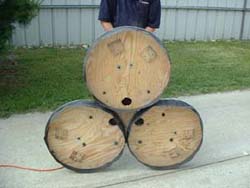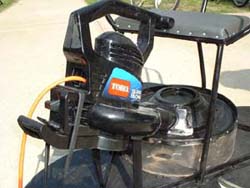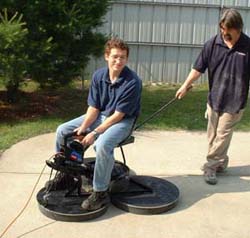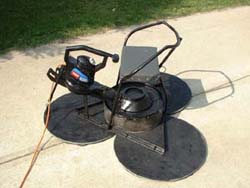
::: The
Science of Hovercraft
Demographic
profile, survey results and supplemental information
related to
The Children’s Science and Technology Museum of Terre Haute's
hovercraft exhibit entitled
“The Science of Hovercraft: It’s Just a Matter of Inches!”
by
James C. Wallace II
In August 2002, an interactive exhibit was created
and installed at The Children’s Science and Technology
Museum of Terre Haute. This exhibit is comprised of
informational signage relating both the concepts involved
in hovercraft technology and the history behind the
development of hovercraft, as well as a functioning
HoverChair that museum
visitors can ride upon.
The purpose of this exhibit is to relate to visitors
the uniqueness of hovercraft as well as their place
in historical context. In addition, this exhibit was
designed with attention being placed upon adherence
to curriculum standards and benchmarks in science education
in order to satisfy the needs of educators within the
region who utilize the museum as an outside educational
resource. To this end, a survey was recently conducted
marking the one-year anniversary of the exhibit's installation
in order to gauge the effectiveness of the exhibit
as it was initially envisioned.
Demographic Profiles and Analysis
Demographic analysis of visitor patterns during the
months of May through July of 2003 demonstrate substantial
visitor interaction during a time that is considered
to be the museum’s slow period. The demographic
profile numbers are broken down by monthly statistics
and are as follows:
| Dates |
Adult |
Child |
Senior |
Group* |
Member* |
Under 2 |
Total |
May
2003 |
| May 01-31 |
105 |
112 |
18 |
1239 |
281 |
11 |
336 |
June
2003 |
| June 01-30 |
180 |
220 |
47 |
71 |
441 |
50 |
1009 |
July
2003 |
July 01-31 |
197 |
266 |
34 |
160 |
365 |
52 |
1075 |
Summer
2003 Totals |
Summer 2003 |
482 |
598 |
99 |
1470 |
1087 |
113 |
2420 |
* Indicates breakdown of attendance
into member/non-member (group) profile and does contribute
to total attendance
As shown by the demographic profile, museum visitation
stands at nearly 2500 during what is generally considered
to be the museum’s slowest period. While not
available at the time of the survey, interviews with
the museum’s director, Jerry Mansfield, indicate
that total attendance during the preceding 12 months
stands at approximately 13,300, with more than 10,800
being accounted for during the preceding school year.
Given that the target audience for this exhibit is
at the 3rd through 5th grade level, all analysis of
feedback and audience response will be done at that
level.
Survey Questions and Responses
The museum’s director, Jerry Mansfield was
asked a number of questions in order to determine the
exhibit's effectiveness, educational value and content,
as well as future direction. The following responses
will be used to further evaluate content and will then
be integrated into future exhibits regarding hovercraft.
1. How are museum visitors receiving the Hovercraft
exhibit?
“The exhibit, especially the HoverChair, is
considered to be the most popular permanent exhibit
in the museum.” Mr. Mansfield also states that
the exhibit has become the focal point of almost every
visitor’s experience, especially in regards to
when parents become actively involved in the operation
of the HoverChair. In Mr. Mansfield own words, “Kids
just love to be on it!”
2. Is there any part of the exhibit that visitors
dislike?
Mr. Mansfield indicates that the only portion of the
exhibit that may potentially bother visitors is the
noise generated by the HoverChair; however, he also
indicates that this is true only with very young visitors
(usually under 2 years of age) and only for a brief
period of time until they acclimate to the abrupt sound.
Since this exhibit is designed for a much older audience,
it may be appropriate to include a warning sign for
parents/guardians warning them of the noise level of
this exhibit.
3. What level of staff supervision is required
for this exhibit?
Initially, Mr. Mansfield indicated that a staff member
or volunteer was posted at the exhibit continuously
during the early phase of the exhibit. The ease with
which the exhibit operates, however, has prompted staffing
levels to be nearly eliminated during ordinary visitation
and only during specific school visits will a staff
member or volunteer be assigned to operate the exhibit.
This is done more to facilitate orderly operation and
to more effectively disseminate educational information.
In addition, Mr. Mansfield also states that parents/guardians
become more actively involved in the exhibit operation
when the exhibit is left unmanned which, in effect,
promotes more parental/guardian involvement and provides
for a more rewarding experience.
4. How is the HoverChair holding up?
“Remarkably well”, states Mr. Mansfield, “especially
given the amount of traffic that it endures.” During
the early phases of the exhibit, the HoverChair was
equipped with a 7.5-amp motor, which was not particularly
effective with older, more robust kids. During the
Spring 2003 break, a new 12-amp motor was installed.
In addition, several other upgrades were added, including
side rails, rubber bracket pads, a sharper angle skirt,
foam padding for the seat, bungee cord motor mount,
and a better seal for the plenum chamber.
 
 
5. Have the upgrades been effective?
The aforementioned upgrades have dramatically improved
operations, safety and overall appearance. Analysis
of the skirt material indicates that the greater motor
capacity, along with the improved plenum chamber seal
will provide for longer skirt life, necessitating fewer
replacements over the life of the chair. The added
side rails, along with the foam padding for the seat
improve overall safety and give the HoverChair a better
appearance. The new rubber bracket pads, along with
the bungee cord motor mount have effectively eliminated
any wear on the motor casing where it is in contact
with any metal.
6. Has the signage been effective and has
it held up well during the exhibit?
According to Mr. Mansfield, the signage has been very
effective in conveying information relating to hovercraft
technology, history and the basic science underlying
the exhibit. At this point there appears to be no need
to upgrade the current signage. Mr. Mansfield did indicate
that when brochures were available promoting the World
Hovercraft Championship event, they were distributed
very rapidly and he felt contributed to attendance
at the aforementioned event.
7. Is any information missing?
When asked if there was any information missing or
any that he felt should be included which was not,
Mr. Mansfield stated that the signage was very complete
and quite appropriate for the school curriculum for
which it was initially designed. In addition, he also
stated that he felt there was no need to specifically
design a pre/post visit teachers' guide until such
time as this exhibit became a more active component
of the museum’s school curriculum web page. This
is planned for the following year. Both Mr. Mansfield
and the exhibit's designer agree that if a larger exhibit
is planned for a bigger facility, then curriculum guides,
pre/post visit teachers' guides and Distance Learning
programs should be a critical component of this style
of exhibit.
8. What has been the most dramatic or effective
single element of this exhibit?
Mr. Mansfield states that when visitors sit on the
HoverChair while it is not operating and are then asked
to move the HoverChair, they are usually unable to
do so. Then the HoverChair is turned on and the visitor
is then able to move about on the HoverChair with virtually
no effort. “This demonstration does more to convey
how hovercraft work then any other portion of the exhibit
and elicits more amazement than any other portion of
the exhibit,” states Mr. Mansfield.
Supplemental Information
As stated earlier, The Children’s Science and
Technology Museum of Terre Haute plans on featuring
the hovercraft exhibit entitled “The
Science of Hovercraft: It’s Just a Matter of
Inches!” as a major component of
its school curriculum web page. In addition, a new
facility for the museum is being planned which is being
targeted for completion in 2006. Mr. Mansfield states
that the hovercraft exhibit will receive its own dedicated
space as opposed to its current status as a rotating
exhibit. When this occurs, more signage, a display
case, curriculum guides, pre/post visit teachers' guides
and Distance Learning programs should be added to further
enhance the effectiveness of this exhibit.
|